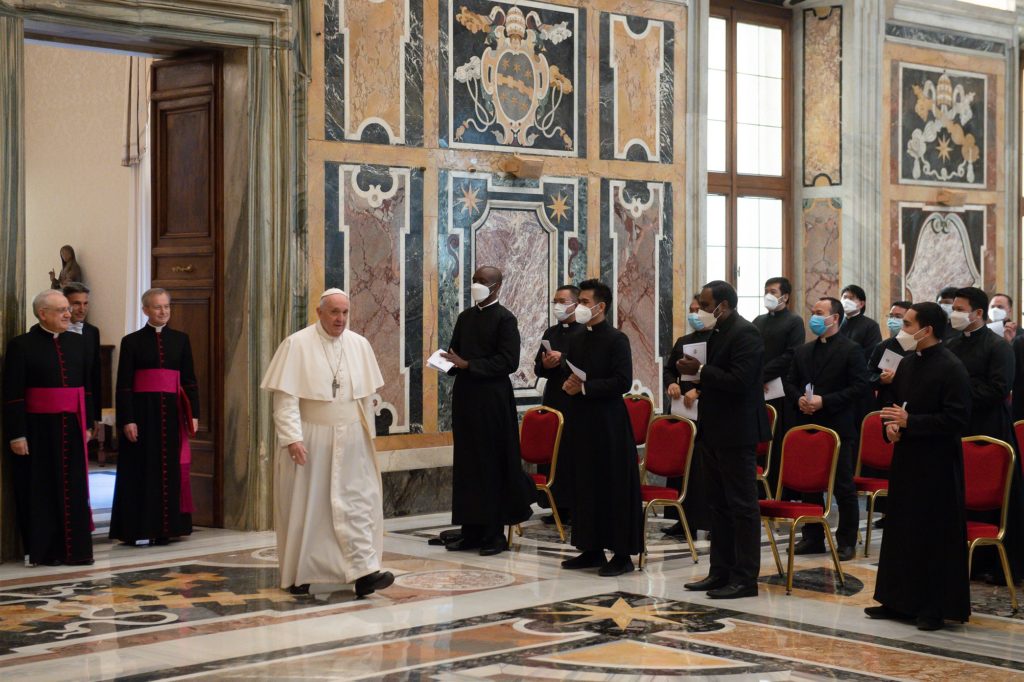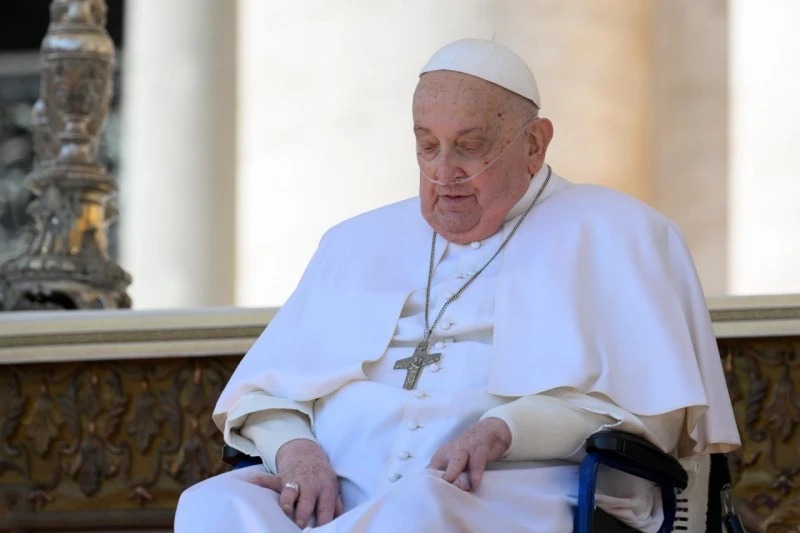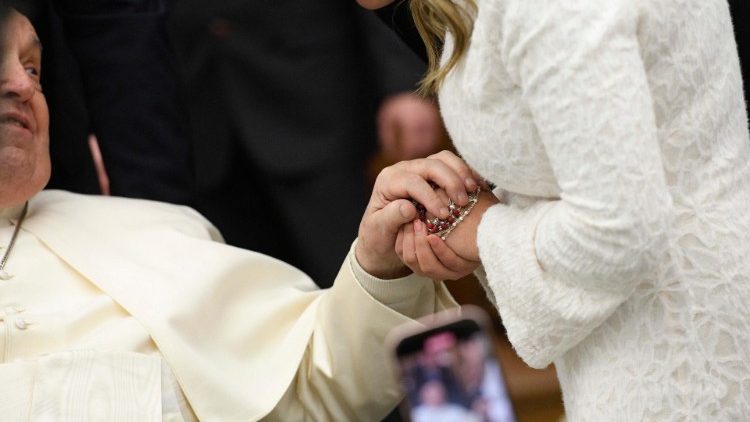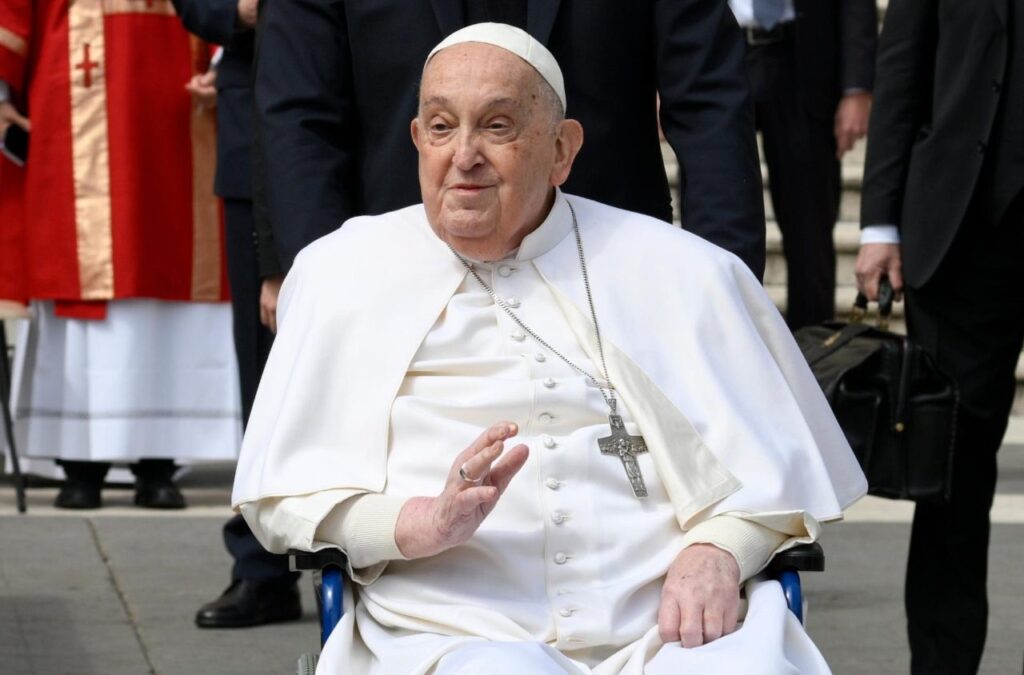Pope to Priests: When Tired and Discouraged, Remember All Good God Has Done in Your Lives
Receives Community of the Pontifical Filipino College 'de Nuestra Señora de la Paz y Buen Viaje'

When you feel tired and discouraged, remember all the good God has done in your lives. Pope Francis expressed this today, March 22, 2021, to the priests and seminarians of the Community of the Pontifical Filipino College “de Nuestra Señora de la Paz y Buen Viaje”, on the occasion of the 500th anniversary of the nation’s evangelization and the 70th of the college’s founding.
“Together,” the Pope began, “let us thank the Lord for these sixty years of priestly formation, which have given so many seminarians and priests the opportunity to grow as priests in accordance with the heart of Christ for the service of the People of God in the Philippines.”
On the basis of the anniversaries, the Jesuit Pontiff shared some reflections on time, “a gift that God has given us and entrusted to our responsibility.” The Holy Father called on those before him to live in the ‘today’, concretely, and not in the future. He urged them to cherish their blessings, not hesitating to say “thank you,” to do good works, or to look ahead with hope.
The Holy Father encouraged them to welcome the opportunities that the Lord gives them to follow Him and to configure their lives to Him.
When You Feel Tired & Discouraged
“When you happen to feel tired and discouraged – this happens to all of us – when you feel downcast because of some trial or failure,” Pope Francis said to them, “look back at your history, not to escape into an “ideal” past, but to rediscover the impetus and emotion of “first love”, that of Jeremiah.”
Recalling the need to return “to the first love,” the Pontiff continued: “It is good to retrace God’s steps in our lives, all the times when the Lord has crossed our path, to correct, encourage, revive, forgive. In this way, we can see clearly that the Lord has never abandoned us, that he has always been at our side, sometimes more discreetly, sometimes more clearly, even in what seemed to be the darkest and harshest moments.”
Place Prepared in Our Father’s House
If the past offers the opportunity to be aware of the solidity of our faith and our vocation, the Pope said, “the future broadens our horizons and is a school of hope.”
Francis concluded, acknowledging that “Christian life is by its nature projected into the future, the near future, but also the more distant future at the end of time, when we will be able to meet the Risen Lord who has gone to prepare a place for us in the Father’s house.”
Below is the Vatican-provided text of the Pope’s full remarks:
***
Dear Priests, Religious Sisters and Lay Faithful
who form the community of the Pontifical Philippine College “de Nuestra Señora de la Paz y Buen Viaje“, I am pleased to meet you on the occasion of the 500th anniversary of the first proclamation of the Christian faith in the Philippines and of the celebration of the first Holy Mass, which was on 31 March 1561, Easter Day. And it is also worth remembering another anniversary that concerns you, closer in time: that of the foundation of your College on 29 June 1961. Saint John XXIII personally inaugurated it on 7 October of that year. Together let us thank the Lord for these sixty years of priestly formation, which have given so many seminarians and priests the opportunity to grow as priests in accordance with the heart of Christ for the service of the People of God in the Philippines.
On the basis of these anniversaries, I would like to share with you some reflections on time, of which our lives are made up, and which is a gift that God has given us and entrusted to our responsibility, so that we may take the opportunity to say “thank you”, to do good works and to look ahead with hope. And I would like to thank the rector for his words. But, excuse me, I thought he was a boy from Catholic Action! You never get old! And I am happy that Cardinal [Tagle] is with you. And this is a good thing. Let’s get back to time.
First of all, let us think of the past, of the history that every person and every reality brings with them. To go back in time, even centuries, as we do for the birth of the Church in the Philippines, is to walk with the memory, retracing the footsteps of those who have gone before us, to return to the origins of your faith with feelings of gratitude and amazement at what has been given to you. Each anniversary gives us the opportunity to leaf through the “family album” and remember where we came from, what faith we lived and what Gospel witnesses enabled us to be who we are now. Memory. That Deuteronomic memory; that memory that is always the basis of daily life. The memory of the journey that has gone by… “Remember, make remembrance”, Moses said in Deuteronomy. “Remember the times, the graces of God, do not forget”. Remember the roots. Paul said to Timothy: “Remember your mother, your grandmother”. The roots, the memory. And also the author of the Letter to the Hebrews: “Recall pristinos dies, the former days, and remember those who proclaimed the Gospel to you”. A Christianity without memory is an encyclopaedia, but it is not life.
And this – memory – applies to an entire people, but also for each individual person. Each one of us must go back and remember the many steps, good and bad, but always see that God’s Providence is there. Looking back makes us remember those who first kindled our love for Jesus – a parish priest, a nun, our grandparents, or parents – to whom we are indebted for the greatest of gifts. And for priests, the memory of discovering their vocation, of the moment when they said their first, convinced “yes” to God’s call, as well as the day of ordination, is particularly dear.
When you happen to feel tired and discouraged – this happens to all of us – when you feel downcast because of some trial or failure, look back at your history, not to escape into an “ideal” past, but to rediscover the impetus and emotion of “first love”, that of Jeremiah (cf. Jer 2:2). Returning to the first love. It is good to retrace God’s steps in our lives, all the times when the Lord has crossed our path, to correct, encourage, revive, forgive. In this way, we can see clearly that the Lord has never abandoned us, that he has always been at our side, sometimes more discreetly, sometimes more clearly, even in what seemed to be the darkest and harshest moments.
If the past offers the opportunity to be aware of the solidity of our faith and our vocation, the future broadens our horizons and is a school of hope. Christian life is by its nature projected into the future, the near future but also the more distant future, at the end of time, when we will be able to meet the Risen Lord who has gone to prepare a place for us in the Father’s house (cf. Jn 14:2).
Just as the past must not be an intimist retreat, so too we must combat the temptation to rush forward, when we do not live our present in peace. We are in the seminary and everything weighs on us, because we imagine what life will be like after ordination. We are entrusted with a pastoral task and, at the first difficulties, we already think of the place where we could really give the best of ourselves. And so on, a sinful procession into the future, immature, so as to escape from the present. The real future is anchored in the present and the past. And this is what many people do for years, or for a lifetime if they do not reach conversion. It is something of the spirit of complaint: “and now this, this, and this…’. But look ahead, and look back. You have the promise. You have the lesson. Let it now be a covenant that takes you back, but don’t go around in that labyrinth of your own complaints, your own dissatisfactions, your own sorrows. This is the beginning of an ugly, ugly disease that is bitterness of soul.
Dear priests – but this also applies to consecrated persons and to the laity, to all – do not be people of the eternal tomorrow, who are always moving forward, into a hypothetical ideal condition – the bad utopia – that postpones the opportune and decisive moment to do something good; and do not live in a perpetual condition of “apnoea”, limiting yourselves to bearing the present and waiting for it to pass. “Yes, Lord, tomorrow, tomorrow…”. That unhealthy tomorrow.
Future in a positive sense means, instead, a prophetic outlook, the ability of the disciple who, faithful to the Master, starting from that is in front of him, knows how to see what does not yet exist and works according to his own vocation to realise it, as a docile instrument in the hands of God.
And after having “travelled” in the past and in the future, let us return to the present, the only time that is now in our hands, which we are called to take advantage of for a journey of conversion and sanctification. The present is the moment in which God calls, not yesterday, not tomorrow: today; we are called to live today, including its contradictions, sufferings and miseries – even our sins – which we are not to flee from or avoid, but to take up and love as opportunities that the Lord offers us to be more intimately united with Him and also on the cross.
And today, dear friends, is the time for concreteness. Today is concrete. You priests are in Rome for study and ongoing formation in the community of this College. You are not asked to regret leaving behind the parishes from which you have come, nor to imagine the “prestigious” posts that the Bishop will certainly want to entrust to you on your return… No, not that! That is fantasy. On the contrary, it is a matter of loving this real community, of serving the brothers that God has placed alongside you – and not speaking ill of them! It is about seizing the opportunities for pastoral training that are given to you. Given the reason why you are here, it is a matter of being serious and diligent in your studies. As Saint John Paul II told your predecessors, “through your commitment to study you will be prepared to carry out the ministry of the Word, proclaiming the mystery of salvation clearly and without ambiguity, distinguishing it from mere human opinion” (2 June 2001).
Knowing the past, projected into the future, in order to better live the present; this is an opportune time for formation and sanctification, welcoming the opportunities that the Lord gives you to follow him and to configure your lives to him, even when you are far from your beloved Philippines.
I conclude with the words of Saint John XXIII, those he addressed sixty years ago to the first community of the Filipino College, so that all priests may find here “fe y cultura en fuente abundante y ambiente fraternal, y así pertrechados volverán a su patria, como escogidos pregoneros de la verdad” (Radio Message, 7 October 1961). Thank you!
[Vatican-provided text]
Related

Pope Francis’ Catechesis: God always comes to find us!
Exaudi Staff
17 April, 2025
5 min

Francis calls for facilitating faith travel: “Young people and families cannot be left behind”
Exaudi Staff
17 April, 2025
1 min

Pope Francis in active recovery: preparing the meditations for the Stations of the Cross while delegating the liturgies of the Triduum
Exaudi Staff
16 April, 2025
2 min

Francis Promotes Spiritual and Pastoral Renewal in Vatican Diplomacy
Exaudi Staff
16 April, 2025
8 min
 (EN)
(EN)
 (ES)
(ES)
 (IT)
(IT)

